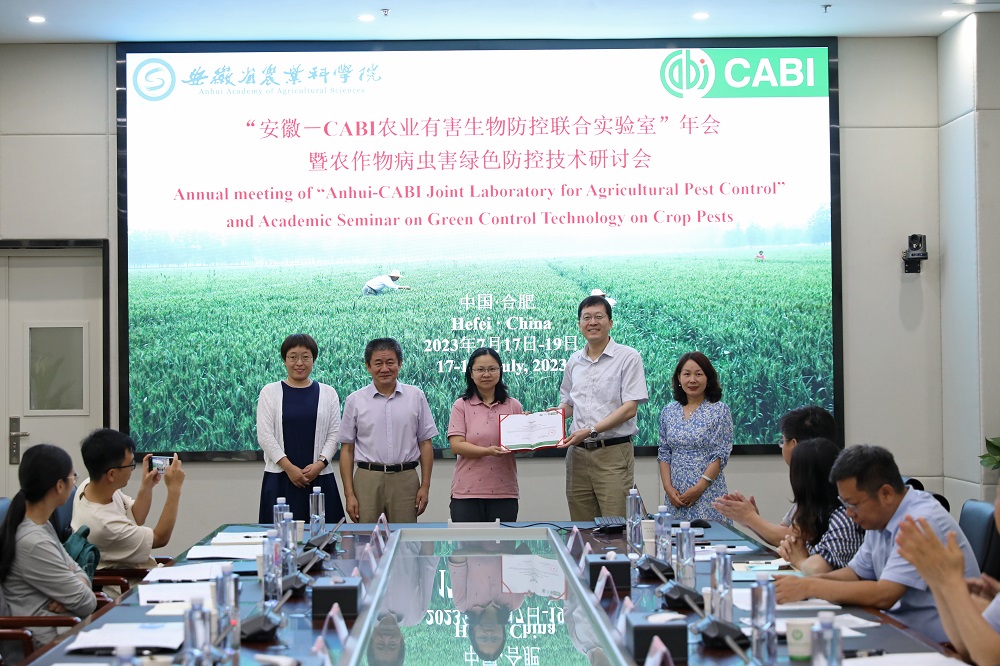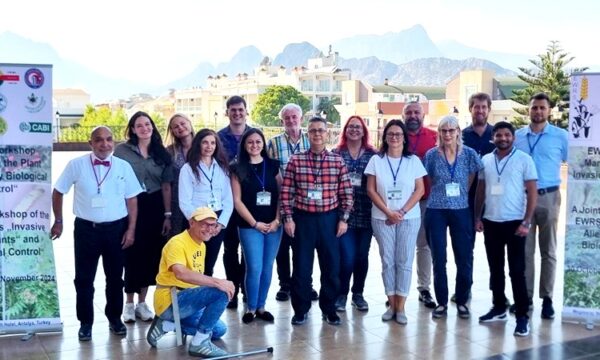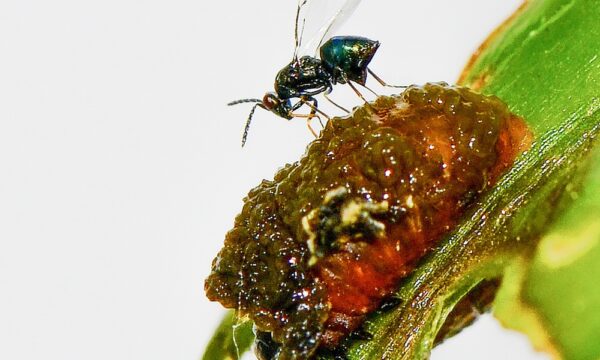
Scientific progress is being made in the fight against crop pests including Oriental migratory locusts, spotted-wing drosophila, Phthorimaea absoluta, pepper Phytophthora blight, and maize leaf spot disease.
This is being achieved via the application of ecological control, multidimensional management under climate smart agriculture which was highlighted at the annual meeting of the Anhui-CABI Joint Laboratory for Agricultural Pest Control in Hefei City, Anhui Province, China.
The Anhui-CABI Joint Laboratory for Agricultural Pest Control (hereafter with Anhui Subcentre) was established in 2021 and hosted by the Institute of Plant Protection and Agro-Products Safety, Anhui Academy of Agricultural Sciences (IPPAS, AAAS).
It is a branch of the MARA-CABI Joint Laboratory for Biosafety, based in the Institute of Plant Protection, Chinese Academy of Agricultural Sciences (IPPCAAS), and extends the latter’s partnership and collaboration with Chinese institutions in the field of plant protection.
Dr Feng Zhang, CABI’s Regional Director, East & South-East Asia, and a co-director of the Anhui Subcentre, attended the meeting along with Dr Hongmei Li, Senior Coordinator Research, who presented on CABI’s work to tackle Oriental migratory locusts which threaten crop production in China.
Back in February, for example, a study led by scientists from the Chinese MARA-CABI Joint Laboratory for Biosafety was published in the journal Frontiers in Physiology. It discovered the optimum time to apply safer-to-use and more environmentally-friendly biopesticides to fight the Oriental migratory locust pest.
In respect of the Anhui Subcentre specifically, seven papers were published of which five were published in SCI indexed journals. Six patents were authorised by China and three other country patents in the United States of America, Italy and Belgium.
Throughout 2022, more than 10 experts visited the Anhui Subcentre and staff took part in at least three online international conferences. They included the Talented Young Scientist Program Seminar on Agriculture and the International Symposium on Joint Management of Cross-border Crop Pests in China and Southeast Asian Countries.
2022 also saw the winning of Anhui Provincial Key Research and Development Project, conducting research cooperation and development of non-chemical prevention and control approaches against the fall armyworm, (Spodoptera frugiperda).
The achievements of the Joint Laboratory model and Anhui Subcentre were highly recognised and appreciated by Professor Li Zefu, Vice President of AAAS, and Professor Zhang Jie, Deputy Director General of IPPCAAS.
Going forward, it was highly expected that the Anhui Subcentre will play an important role in strengthening agricultural science and technology collaboration between AAAS and CABI as well as its member country partners along the Belt and Road, particularly ecology-based pest control techniques and green plant protection products.
The participants also discussed preparations to celebrate the 15th anniversary of the MARA-CABI Joint Laboratory for Biosafety which will take place between 29 October and 1 November 2023 in Kunming City, Yunnan Province, China.
Two secondments to the MARA-CABI European Laboratory were successfully completed in December 2022 and two certificates were awarded in recognition to Dr Yongzhi Zhong and Dr Xiaoqing Xian respectively.
Along with the Anhui Subcentre, other subcentres are the Yunnan-CABI Sub-centre for Integrated Prevention and Control of Trans-boundary Pests, the Shandong Sub-centre for Biological Control.
In the past year, the MARA-CABI Joint Laboratory for Biosafety, its affiliated European lab and its Chinese subcentres have provide new biocontrol solutions for a range of crop pests and diseases.
These include green mirid bugs (Apolygus lucorum), fall armyworm, brown marmorated stink bug (Halyomorpha halys), spotted lanternfly (Lycorma delicatula), yellow-spined bamboo locust (Ceracris kiangsu), Maize Lethal Necrosis (MLN) disease and wheat aphid (Diuraphis noxia).

Additional information
Main image: Dr Yongzhi Zhong and Dr Xiaoqing Xian receive their certificates for successfully completing secondments to the MARA-CABI European Laboratory during the annual meeting of the Anhui-CABI Joint Laboratory for Agricultural Pest Control (Credit: Anhui Subcentre).
Relevant stories
Related News & Blogs
Biological control in action: Zambia’s field days on fighting fall armyworm
Experts from CABI recently held two field days and an expo in Zambia, showcasing innovative approaches to pest management to 584 farmers, agro-dealers and other stakeholders to help raise awareness of approaches to tackle the invasive fall armyworm (Sp…
11 June 2025




